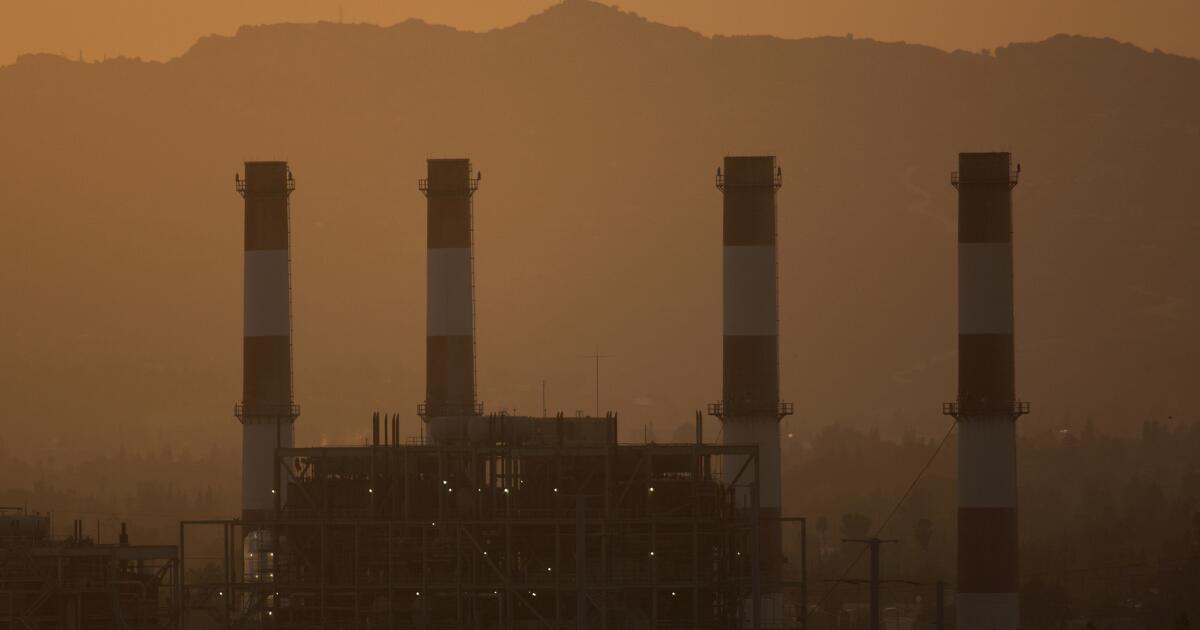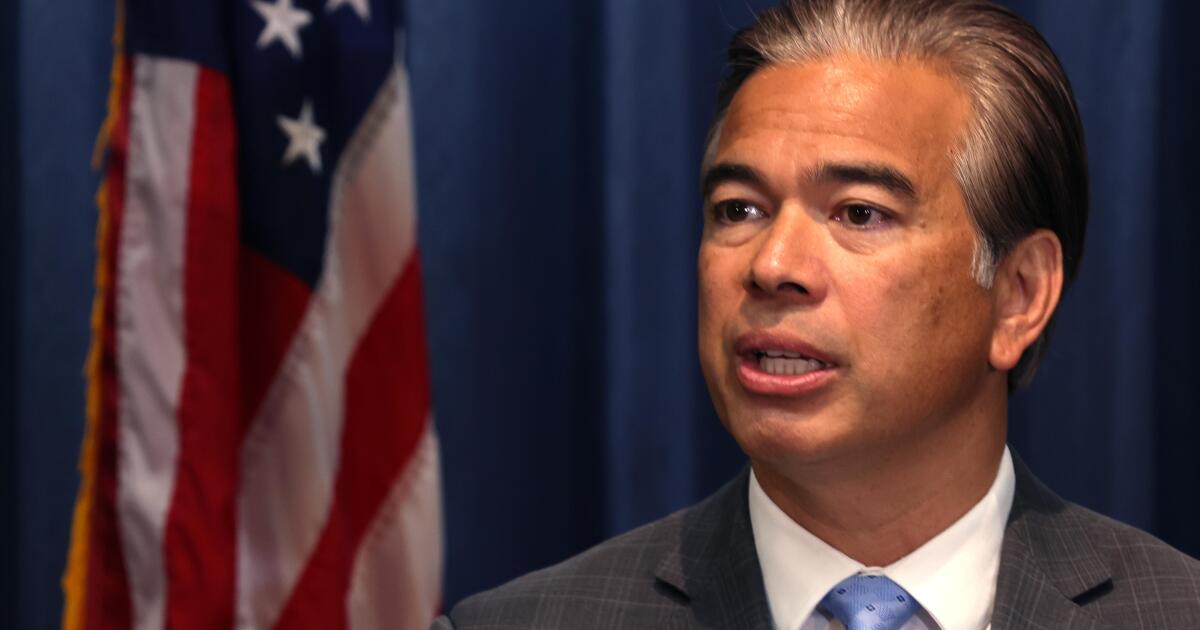As Trump guts greenhouse gas reporting, California has its own rules
For nearly 20 years, thousands of industrial plants across the U.S. and California have been required to track and report the greenhouse gas pollution they spew into the atmosphere.
This month, the Trump administration moved to permanently end that program, which has long held bipartisan support, originating during the administration of George W. Bush. President Trump’s Environmental Protection Agency administrator, Lee Zeldin, said that greenhouse gas reporting was expensive and burdensome, and that cutting the program would save American businesses up to $2.4 billion in regulatory costs.
But ending the requirement will make it harder for some state regulators to track climate progress, and for residents to know if their neighboring power plant or factory is reducing or increasing emissions.
“Measuring and reporting climate pollution is a critical step in reducing the deadly impacts of climate-driven extremes that cause more pollution, catastrophic weather events, health emergencies and deaths,” said Will Barrett, assistant vice president for nationwide clean air policy at the American Lung Assn. “Ignoring this reality is a deadly choice, and not one that EPA should be making for American families.”
The EPA’s Greenhouse Gas Reporting Program requires about 8,000 power plants, oil refineries and other industrial facilities to report their output each year, representing about 90% of the country’s emissions. Greenhouse gases are by far the largest driver of climate change.
If finalized, the proposal to end the program would remove reporting obligations for most large facilities and all fuel and industrial gas suppliers, the EPA said. The move comes after various business groups have lobbied the administration for reduced regulatory requirements across numerous federal agencies.
Environmental groups said the announcement marks yet another blow from an administration that has already taken aim at many of the nation’s bedrock climate programs. The EPA this year has also proposed rolling back more than 30 rules and regulations that govern air and water quality while simultaneously promoting oil and gas production. Among the proposed repeals is the so-called endangerment finding, which establishes that fossil fuel emissions pose a threat to human health and the environment.
California, however, may be better prepared to weather the storm than other states.
The California Air Resources Board — a major state agency under the umbrella of the California EPA — administers its own state-level greenhouse gas reporting program that in some ways exceeds that of the federal one that is now on the chopping block.
CARB requires large stationary polluters that emit over 10,000 metric tons of carbon dioxide equivalent to report their emissions each year, compared with the minimum 25,000 metric tons at the EPA. The state’s program also includes additional reporting categories such as fuel suppliers and electricity importers that the EPA does not require.
“We’ve been taking climate change seriously for many years,” said John Balmes, a professor emeritus at UC Berkeley who also serves as CARB’s physician board member. “Knowing what greenhouse gas emissions there are in California is important to our planning mitigation strategy, so we have pretty strict reporting.”
Unlike the federal program, California’s system also goes beyond data collection and is directly tied to compliance obligations. That’s because CARB’s reporting is integrated with cap-and-trade, California’s signature climate program that sets limits on greenhouse gas emissions and allows large polluters to buy and sell unused emission allowances at quarterly auctions.
CARB uses the data reported by the state’s emitters to determine their allowance allocations. Each year, fewer allowances are created, lowering the total annual climate pollution in the state. The program is seen as critical to California meeting its ambitious climate goals — including 100% carbon neutrality by 2045 — and state lawmakers on Saturday agreed to extend cap-and-trade for an additional 15 years through that same year.
“It’s a global issue, but jurisdictions have to lead where they can, and California has long been a sub-national leader in climate change mitigation policy,” Balmes said.
For his part, Zeldin said the cut is justified by lack of regulations tied to the EPA’s reporting program. The federal program’s facility-level data is used to monitor national emission estimates and trends over time, identify opportunities for reductions, inform state and local policies, and aid communities in identifying nearby sources of pollution.
“The Greenhouse Gas Reporting Program is nothing more than bureaucratic red tape that does nothing to improve air quality,” Zeldin said in a news release. “Instead, it costs American businesses and manufacturing billions of dollars, driving up the cost of living, jeopardizing our nation’s prosperity and hurting American communities.”
California’s reporting program applies to more than 550 facilities, the largest of which include Pacific Gas & Electric, the Southern California Gas Co. and fossil fuel companies such as Chevron, Marathon and Phillips 66, according to state data from 2023, the most recent year available. Marathon’s Los Angeles Refinery — the largest refinery on the West Coast — was also high on the list.
Total emissions reported to the state that year were about 370 million metric tons of carbon dioxide equivalent, compared with 2.58 billion metric tons reported to the federal program that same year.
Under the EPA’s proposal, none of these entities would be required to report their emissions to the federal government. Though they would still be subject to state reporting, officials noted that pollution doesn’t stop at state lines.
“Requiring polluters to report their emissions is a critical way local governments can keep track of how industries in their cities are impacting people’s health,” read a statement from Kate Wright, executive director of Climate Mayors, a bipartisan group of nearly 350 mayors in the U.S. that includes L.A. Mayor Karen Bass.
“Air pollution kills about 135,000 Americans each year — and cities are working hard every day to lower that number,” Wright said. “They need access to that data to help them make the best decisions for their communities and ensure people across the country can breathe clean air free of toxic, cancer-causing chemicals. Without that accountability in place, emissions will go unchecked, and thousands of Americans will pay the price.”
While California is home to many nation-leading climate policies, the state has also long suffered from some of the worst air quality in the country — driven largely because of its vast numbers of cars, trucks, trains and cargo vessels and by topography that traps pollution in the state’s interior. Los Angeles has been ranked the nation’s smoggiest city 25 out of the last 26 years.
Earlier this year, the Trump administration took aim at some of the state’s regulatory muscle by moving to revoke its authority to set strict tailpipe emission standards under the EPA — an action that prompted California to respond with a lawsuit.
Trump has also moved to roll back Biden-era regulations designed to address mercury air pollution and carbon dioxide emissions from power plants, and has offered large polluters two-year exemptions from key regulations governed by the Clean Air Act, which they can request by sending an email.
The Environmental Protection Network, a D.C.-based group composed of more than 650 former EPA employees, estimated that the repeal of these and other safeguards would lead to nearly 200,000 premature deaths through 2050 and cause more than 10,000 asthma attacks each day for U.S. children, among other outcomes.
The latest proposal to end the greenhouse gas reporting program is a “broadside against climate science and policies to protect human health,” said Barrett, of the American Lung Assn.
Such federal efforts, he added, “shine a spotlight on the importance of California’s ongoing climate and clean air leadership.”
EPA will initiate a public comment period to solicit input on its proposal to eliminate the greenhouse gas reporting program in the weeks ahead.

